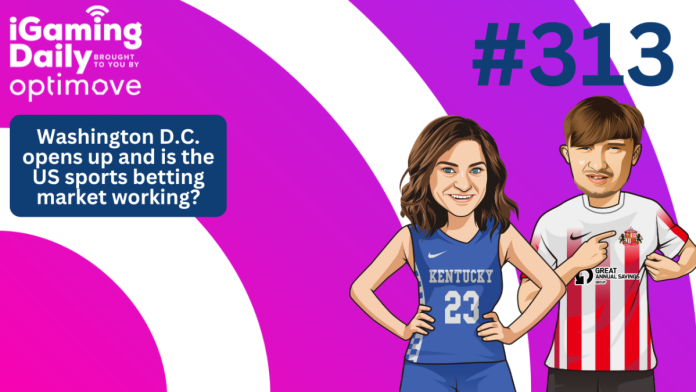We are taking a trip across the pond for today’s episode of iGaming Daily, supported by Optimove.
Jessica Welman, Editor of SBC Americas, is joined by Charlie Horner, SBC’s Media Manager, to discuss the news that Washington, D.C has opened up its sports betting market before examining a recent speech by renowned sports bettor Billy Walters who claimed that sports betting in the US isn’t working.
Washington, D.C.’s market has opened up due to councilmember Kenyan McDuffie’s Sports Wagering Amendment Act of 2024 gaining enough support to be included in D.C.’s budget.
Prior to this, it had operated a single-operator model through lottery provider Intralot, however, the district had come under scrutiny for its poor performance compared to revenue projections.
Retail betting through BetMGM and Caesars was also available at Capital One Arena and Nationals Park, a popular option for many players in Washington, D.C.
“The problem with Intralot is it was a clunky app [and] it was the only app that I’ve seen do heavier than minus 110 lines,” explained Jess.
“In general, the VIG was noticeably higher on this app than anywhere else in the US. So people would rather travel to the stadiums, and people in D.C. have told me traffic is not fun there. Imagine being like, I would rather deal with the traffic than bet on this app.”
Since the market opened up, Caesars, BetMGM and DraftKings have all launched in the district. FanDuel, who took over Intralot’s subcontractor license in April, have now also pivoted to a Class A sports betting license.
Jess speculates that FanDuel may be the “big loser” from the change in regulations given that it is now part of a competitive market rather than being the sole provider.
She added: “FanDuel [had] a monopoly on the only betting market where their projections for five years were $119m. I don’t know what the numbers are going to be now that they’ve had to pivot to a competitive market.
“They’re competing with their three biggest rivals versus having it all to themselves, which I have a feeling they’re not thrilled about. They did file a letter opposing this legislation saying, hey, we can bring you all of this and do this and we won’t be able to do that for you if you switch [to a competitive market].”
After a short break, the attention then turns to a recent speech by sports bettor Billy Walters at the recent National Council of Legislators from Gaming States (NCLGS) conference.
In the speech, Walters claimed that the regulated US sports betting business isn’t working and was highly critical of several aspects of it ranging from fairness to transparency to revenue to taxation.
Walters called for more transparency in the industry regarding the banning of successful bettors, which Jess says was his “most valid criticism at the heart of all this”.
However, she was less complimentary of his view that the discussions that took place to regulate the different US states took place with nobody who knew anything about sports betting.
Jess also questioned who Walters was speaking for and suggested that it was mainly for professional sports bettors rather than the more casual players.
She said: “My question to all of them is, do your interests align with my friend who bets $100 total a week during the NFL season, largely on same game parlays? I just don’t believe that those interests intersect.
“I don’t see Nevada bookmakers taking a bunch of same game parlay’s and that’s what people like to bet now. It’s a different ecosystem. It’s people that enjoy a different kind of betting. They view it as a lottery and don’t care about pricing.”
Walters also claimed that nobody is happy with the results that sports betting revenues have done so far.
Jess describes this view as “wildly out of touch” given that the majority of markets have landed on or ahead of what the expectations were ahead of opening the regulated market.
Charlie added: “Sportsbooks are taking a higher margin than they were previously expected when a lot of these bills were being passed. This is driven by this recreational player who, as we’ve mentioned, likes the same game parlays.
“They’re placing these bets that they realistically know probably aren’t going to come in and it is driving extra tax dollars for the state, which seems to be against the entire argument that Walters is making.”





